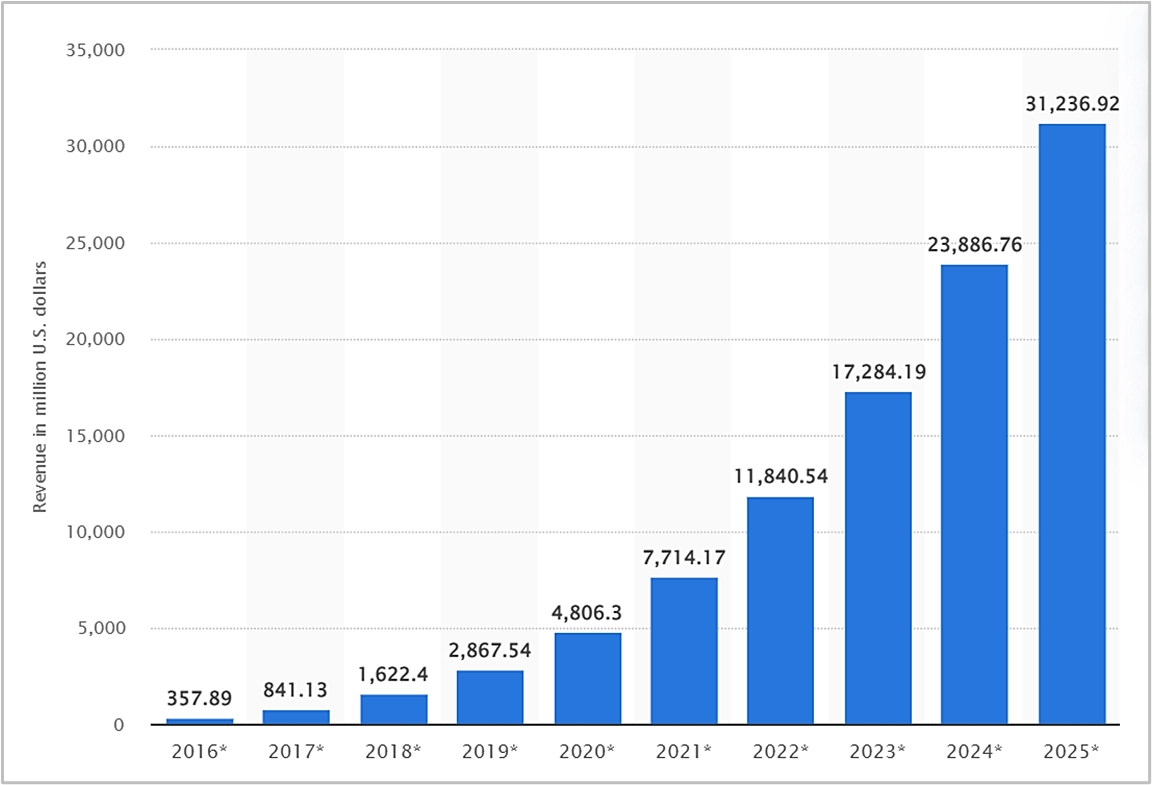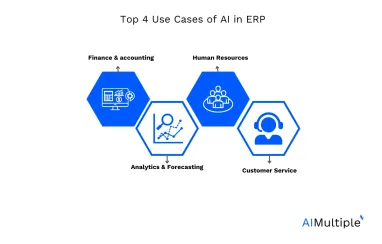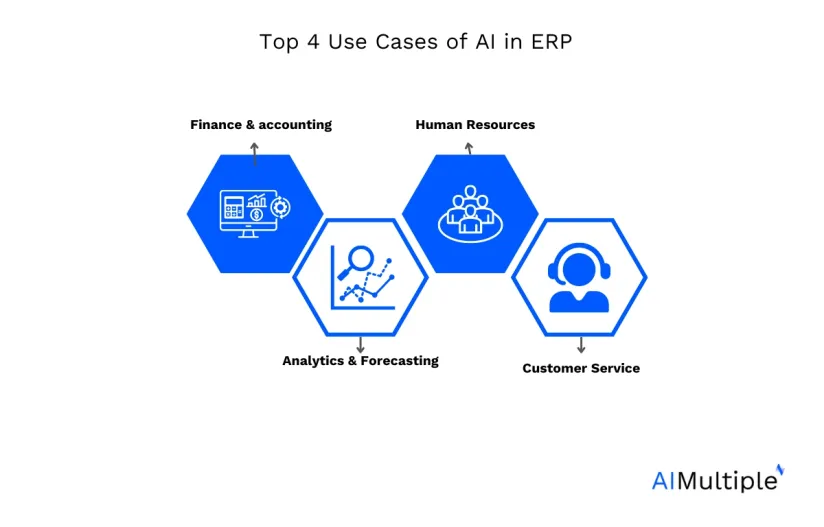Enterprise resource planning (ERP) systems help organizations manage and connect processes in finance, operations, and human resources. The ERP market is expected to reach ~$52bn in 2024.1 As ERP systems handle more complex processes, traditional ERP becomes insufficient. AI capabilities like machine learning models and conversational AI can streamline these processes, leading businesses to invest more in ERP AI solutions
Figure 1. Global AI for enterprise applications market from 2016 to 2025

This article explores top use cases and case studies of AI technology in ERP to better prepare business leaders for future investments in AI.
Use Cases
1. Finance & accounting
AI brings speed and accuracy to financial tasks:
- It automates routine jobs like invoice processing and transaction recording.
- It helps check the accuracy of financial reports.
- It can reduce manual errors and improve cash flow management.
For more, feel free to read our research on generative AI in finance.
Most ERPs offer tools for financial management. However, the use of AI with native integrations can increase the capabilities of ERPs in areas such as document management & accounts payable process.
Sponsored: PairSoft uses AI in accounts payable automation, which improves accuracy and business efficiency by
- minimizing errors, which cuts costs and enhances financial management.
- automatically categorizing invoices based on learned patterns,
- reducing manual data entry,
For a detailed analysis of the increasing capabilities of ERPs in financial operations and accounts payable process:
- Dynamics Accounts Payable Automation
- Blackbaud Accounts Payable (AP) Automation
- Sage Accounts Payable (AP) Automation
- Accounts Payable ERP Integration
2. Advanced analytics & forecasting
Most operations activities such as supply chain management and AI improves enterprise resource planning with better forecasts using historical data and current conditions. It analyzes both past and current data to help companies prepare for what’s next. Key examples include:
- Production: Avoid overproduction or running out of stock by predicting seasonal trends.
- Warehouse: Predict demand to manage inventory better and reduce waste.
- Sales: Forecast sales more accurately to set realistic goals and boost team performance.
Real-life example:
Watch how Samsung is using AI for better demand forecasting
3. Human resources
AI upgrades basic HR tools with smarter insights:
- It personalizes training and development for employees.
- It can screen resumes, rank applicants, and even answer applicant questions automatically.
- It supports performance reviews and salary planning with data-driven insights.
For more, see AI in HR.
See how AI is used for automating recruitment:
4. Customer service
AI-powered chatbots, generative AI assistants, and virtual assistants help:
- Provide consistent AI service around the clock.
- Respond instantly to basic customer questions.
- Free up human agents to focus on complex issues.
Watch how Vodafone leverages AI to offer intelligent customer service
5. Smart reporting and document handling
Generative AI tools can:
- Write reports using real-time ERP data.
- Summarize long documents, such as legal or compliance files.
- Help employees by drafting emails or messages.
These features reduce time spent on writing and reading, while also improving clarity and accuracy.
6. Supply chain logistics and inventory management
AI makes supply chain management more flexible and predictable:
- It predicts stock needs and reduces supply chain disruptions.
- It tracks order fulfillment, helping avoid delivery delays.
- It spots disruptions early, giving time to act.
Real-life example:
World Market’s use of intelligent ERP system—powered by real-time inventory visibility and intelligent order routing—shows how AI-driven ERP solutions can optimize supply chain and inventory management by reducing shipping distances, enabling ship-from-store and BOPIS capabilities, and ensuring faster, more cost-effective fulfillment.2
7. Business process automation
AI can automate routine tasks in day-to-day business life:
- RPA (Robotic Process Automation) handles data entry and document transfers.
- NLP (Natural Language Processing) allows employees to ask the ERP system questions in plain language.
- AI can help with invoice processing, file organization, and report generation.
8. Predictive maintenance
Using data from sensors or digital twins, AI can:
- Predict when machines need maintenance.
- Prevent unexpected breakdowns.
- Reduce repair costs and downtime with predictive analytics from real time insights.
9. Security and anomaly detection
AI-powered ERP systems can monitor systems to:
- Flag unusual activity (such as possible fraud).
- Alert compliance teams early.
- Protect sensitive data and transactions.
This is especially useful for banks and financial firms but now benefits all industries with large data volumes.
10. Procurement and guided purchasing
AI helps companies buy smarter:
- It finds products or suppliers that match set rules like budget or sustainability.
- It recommends vendors based on past orders or performance.
Real-life example:
SAP’s Ariba platform suggests suppliers who meet ethical sourcing standards or specific pricing goals.3
Case studies
1.SAP AI integration in SCM
A recent study shows the application of SAP-specific generative AI in supply chain management.4
Organizations with SAP implementations, such as RISE with SAP and S/4HANA, achieve faster returns on AI investments in supply chain operations. Some key applications were:
- Automated supplier scoring based on historical performance
- Dynamic purchase order adjustments
- Intelligent route planning
- Real-time tracking of shipments
2. AmerisourceBergen
As a drug wholesale company based in the US, AmerisourceBergen had previously used spreadsheets to pull in data from various systems to determine production costs.5 After pulling data, historical information, and know-how of the employees were also considered to figure out how sensitive customers were to price changes.
They then moved to an integrated system that automatically calculates production costs, analyzes historical transaction data, and pulls in outside data such as weather forecasts to create a foundational layer for future deployment of artificial intelligence.
With the old manual system, pricing team members needed to spend 3 hours on more complex price analysis and 5 hours on the more routine tasks involved with price administration. With smart automation, they are able to spend just 1 hour on price administration and the other 7 hours on value-added activities.
3. Mitsubishi Electric
After implementation of the AI and process automation in Oracle Cloud, Mitsubishi Electric claims to have achieved:6
• Uptime has increased 60%
• Production has increased by 30%
• Manual processes reduced by 55%
• Floor space has been reduced by 85%
4. Walmart
As an early adopter of HANA by SAP, Walmart claims to have been able to process its high volume of transaction records (the company operates more than 11,000 stores) within seconds.7
Watch how Walmart expands its use of AI in its stores
Select AI-enabled ERP systems in line with your daily operations
Machine learning capabilities are not the most important criteria in ERP selection. Companies should select ERP systems in line with how they will benefit them while running their daily business operations. However, the below factors are important to ensure that the ERP system is future proof when it comes to machine learning:
- Effective data management: Companies rarely have a chance to modernize their ERP systems since these are critical production systems that have been deeply integrated into the companies’ operations. So companies need to make sure that when they switch to a new ERP system, it is flexible enough to store and provide company data in granular detail, in line with its operations. As long as data is easy to access, companies could use the machine learning components of their ERP or other software to build machine learning models to solve their operational problems.
- Ease of integration: No single company should be expected to be the company’s machine learning software provider since machine learning impacts every aspect of a company’s operations. An ideal ERP software should be easy to integrate for 3rd party providers.
Which vendors integrate AI & ERP?
With increased interest in AI, every major ERP vendor claims to have integrated AI capabilities in their offering. It is impossible to verify all of these claims, but some vendors claim specific improvements in their ERP solution thanks to machine learning:
- Infor Coleman: Provides conversational UX with chat, voice, and image recognition capabilities
- NetSuite Intelligent Cloud Suite claims better insights and greater operational efficiency through the integration of predictive analytics.
- SAP S/4HANA Cloud is a real-time enterprise resource planning suite built on an advanced in-memory platform. HANA enables companies to use machine learning algorithms on their data or build their own solutions with connectors to HANA.8 Predictive analytics, for example, HANA, can facilitate cost forecasting to reduce budget overruns and make more accurate resource investment decisions.
- Microsoft Dynamics AI provides virtual agents, sales insights, and customer service insights thanks to machine learning.
- SYSPRO claims that its ‘digital citizens’ AI-powered bots can integrate directly into the ERP to deal with repetitive tasks across the organization.
- Epicor EVA, AI-based voice command user interface for productivity improvement. It is claimed to streamline routine tasks like quoting and scheduling. It also enables data-driven decisions (e.g., anomaly detection in manufacturing)
You can also check out our list of AI tools and services:
External Links
- 1. Enterprise Resource Planning Software - Worldwide | Forecast. Statista
- 2. World Market | IBM.
- 3. Sustainability and Ethical Sourcing in Procurement - SAP Community .
- 4. Unlocking the power of gen AI in ERP systems | IBM.
- 5. AmerisourceBergen Specialty Group Case Study Streamlined Salesforce.com migration and integration
- 6. Oracle and Mitsubishi Electric Collaborate to Develop Internet of Things… - Supply Chain Management Review. Supply Chain Management Review
- 7. Robert Enslin on X: "With appreciation to Walmart CIO Karenann Terrell, telling the story of how #Walmart runs SAP HANA http://t.co/qd7R6oirVm #SAPPHIRENOW #SAP" / X.
- 8. Machine Learning with SAP HANA - SAP Community .



Comments
Your email address will not be published. All fields are required.